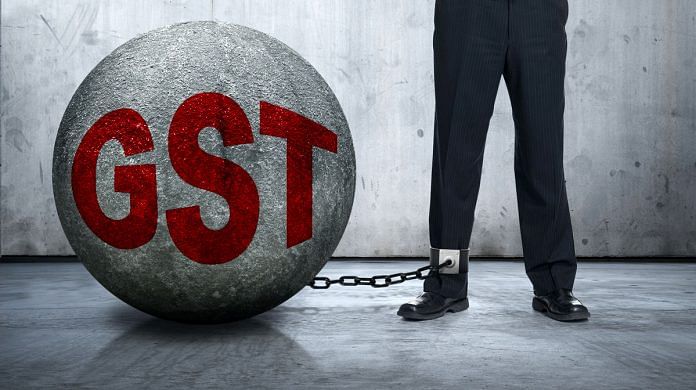If too many people have lost out due to economic decisions like demonetisation and GST, macro-demand will suffer and undercut future growth.
It is quite possible that the macro-economic news will get better from now on, as the shock waves caused first by demonetisation and then by the goods and services tax (GST) subside into ripples. Quarterly growth rates will improve, companies will start reporting better results (indeed, they already have), the manufacturing sector will begin to do better, and exports might sustain their recent recovery.
If all of this happens, the government will not need to be quite as defensive as in recent months. Indeed, if the numbers climb as expected, you should expect Prime Minister Narendra Modi to throw a flurry of counter-punches at the many critics who have found voice in recent weeks after the growth figures slumped.
Even if that happens, though, small businesses may not be celebrating; nor, it seems, might ordinary workers. For both groups, these past 12 months have perhaps been the most trying in recent memory, without any certainty that things will return to normal anytime soon. Granular reporting from business hubs as well as anecdotal accounts present a broad picture of disruption, dislocation, tax uncertainties, extended credit cycles, loss of business, and loss of jobs.
 The effects of demonetisation should be transient, logically speaking, since things should revert to the status quo ante once cash is back in the system. But sometimes things don’t revert to the mean — skilled workers who have gone back to their villages may not return, or a businessman with limited means does not have the capacity to start up again. As for the GST, it should end up being good for the system but poses a structural dilemma, in that it was designed with the specific intent of getting more production to come into the organised sector and get covered by the tax net.
The effects of demonetisation should be transient, logically speaking, since things should revert to the status quo ante once cash is back in the system. But sometimes things don’t revert to the mean — skilled workers who have gone back to their villages may not return, or a businessman with limited means does not have the capacity to start up again. As for the GST, it should end up being good for the system but poses a structural dilemma, in that it was designed with the specific intent of getting more production to come into the organised sector and get covered by the tax net.
Perhaps unintentionally, the onerous reporting requirements and (partly flowing from that) extended credit cycles have put small businesses at an additional disadvantage compared to the pre-GST situation. Sectoral accounts from different parts of the country suggest that many units have either scaled down or simply pulled down their shutters.
The GST Council will probably address some of this next week, by making yet more relaxations to the reporting requirements. But as Indira Rajaraman has argued with clarity in Mint (“Further reforms are required for GST to succeed”, November 3), the situation cannot improve unless the government dispenses with the basic requirement of matching vouchers before tax credits are given — a point that others have argued, including in Business Standard. Such voucher matching was intended to close escape loopholes for tax evaders, but it has had the unintended consequence of payment disruptions, flowing from differences in reporting cycles; the primary sufferers are small businesses. Whether the GST Council will bite this particular bullet remains to be seen, given that those who worry about tax evasion might resist change.
R. Jagannathan, writing in Swarajya magazine (“Why Modinomics will cull the weak and the unviable, leaving India stronger” — reprinted in Business Standard on 22 October), recognises the core of the issue and calls it Darwinomics. While acknowledging that “human beings need to be protected from… government’s follies”, Jagannathan nevertheless endorses the idea of weeding out the weak so that the system as a whole gets stronger.
But the weak are people too. And economically, if there are too many losers, macro-demand will suffer and undercut growth. In more developed societies, the issue is resolved through the provision of safety nets, which don’t exist in India. In a democracy, this can lead to a powerful blowback. The Gujarat elections next month could provide a pointer to the public mood.
Meanwhile, what demonetisation and the GST have done runs counter to the Modi government’s thesis on employment. Namely, that since it cannot create all the jobs required, the solution is to create an entrepreneurial society and new businesses. The thesis was always open to question. Now, surely, hopes on this front must have dimmed.
By Special Arrangement with Business Standard




As the writer is a well known financial expert I was expecting data to support his views.It is true the demonetisation has adversely effected the construction industry where the dealings were in BLACK at least 30-35%.The hotel industry has also seen the pinch as unaccounted money is in short supply.
Other than these I have not heard any major complaints from any other business.
GST has made people to pay tax.sales “without bills are still in vogue and it will take time to bring ALL SALES with in tax regime.But there is improvement and the complaint about hardship is minimal from traders.If the Govt help and support Small Scale Industries to manufacture and buy ancillaries for Defence,Railways etc.they will not suffer.Govt may meet and listen to problems of SSIs through their Assns.
In the world which feels a strong need for soft capitalism and universal basic income, the party in power must take cognisance of one reality: when someone has nothing to lose, he/she still has one vote with which to fight back. Modi government in its quest for radical reform- assuming that it has good intent – must focus on two things in run up to 2019: ensure small victories for the 1.25 billion citizens (low food inflation, for example) and, resist from declaring ‘India shining’ kind of victory in this term.
Amitabh Kant gave the best response; You can not expect India to be a US $ 5 trillion economy with 40% of GDP coming from unorganized sector. The only way to “Nudge” the informal economy to become formal is by shock treatments like Demonetization and GST
Culling the weak and the unviable might sound acceptable in an Ayn Rand novel, not in India’s democracy. Observe how little India’s first genuine right wing government with an absolute parliamentary majority has been able to deviate from the economic orthodoxy of Mrs Gandhi. The helming and the mentoring of the economy can be greatly improved upon.